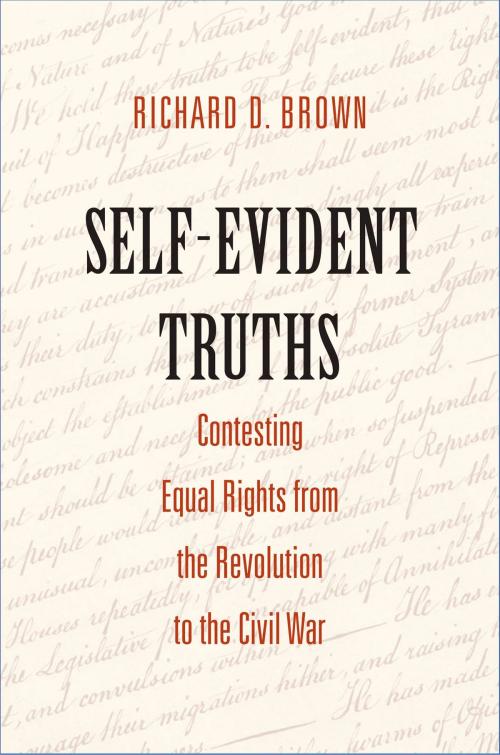Self-Evident Truths
Contesting Equal Rights from the Revolution to the Civil War
Nonfiction, Social & Cultural Studies, Political Science, Government, Democracy, History, Americas, United States, 19th Century| Author: | Richard D. Brown | ISBN: | 9780300227628 |
| Publisher: | Yale University Press | Publication: | February 21, 2017 |
| Imprint: | Yale University Press | Language: | English |
| Author: | Richard D. Brown |
| ISBN: | 9780300227628 |
| Publisher: | Yale University Press |
| Publication: | February 21, 2017 |
| Imprint: | Yale University Press |
| Language: | English |
From a distinguished historian, a detailed and compelling examination of how the early Republic struggled with the idea that “all men are created equal”
How did Americans in the generations following the Declaration of Independence translate its lofty ideals into practice? In this broadly synthetic work, distinguished historian Richard Brown shows that despite its founding statement that “all men are created equal,” the early Republic struggled with every form of social inequality. While people paid homage to the ideal of equal rights, this ideal came up against entrenched social and political practices and beliefs.
Brown illustrates how the ideal was tested in struggles over race and ethnicity, religious freedom, gender and social class, voting rights and citizenship. He shows how high principles fared in criminal trials and divorce cases when minorities, women, and people from different social classes faced judgment. This book offers a much-needed exploration of the ways revolutionary political ideas penetrated popular thinking and everyday practice.
How did Americans in the generations following the Declaration of Independence translate its lofty ideals into practice? In this broadly synthetic work, distinguished historian Richard Brown shows that despite its founding statement that “all men are created equal,” the early Republic struggled with every form of social inequality. While people paid homage to the ideal of equal rights, this ideal came up against entrenched social and political practices and beliefs.
Brown illustrates how the ideal was tested in struggles over race and ethnicity, religious freedom, gender and social class, voting rights and citizenship. He shows how high principles fared in criminal trials and divorce cases when minorities, women, and people from different social classes faced judgment. This book offers a much-needed exploration of the ways revolutionary political ideas penetrated popular thinking and everyday practice.
From a distinguished historian, a detailed and compelling examination of how the early Republic struggled with the idea that “all men are created equal”
How did Americans in the generations following the Declaration of Independence translate its lofty ideals into practice? In this broadly synthetic work, distinguished historian Richard Brown shows that despite its founding statement that “all men are created equal,” the early Republic struggled with every form of social inequality. While people paid homage to the ideal of equal rights, this ideal came up against entrenched social and political practices and beliefs.
Brown illustrates how the ideal was tested in struggles over race and ethnicity, religious freedom, gender and social class, voting rights and citizenship. He shows how high principles fared in criminal trials and divorce cases when minorities, women, and people from different social classes faced judgment. This book offers a much-needed exploration of the ways revolutionary political ideas penetrated popular thinking and everyday practice.
How did Americans in the generations following the Declaration of Independence translate its lofty ideals into practice? In this broadly synthetic work, distinguished historian Richard Brown shows that despite its founding statement that “all men are created equal,” the early Republic struggled with every form of social inequality. While people paid homage to the ideal of equal rights, this ideal came up against entrenched social and political practices and beliefs.
Brown illustrates how the ideal was tested in struggles over race and ethnicity, religious freedom, gender and social class, voting rights and citizenship. He shows how high principles fared in criminal trials and divorce cases when minorities, women, and people from different social classes faced judgment. This book offers a much-needed exploration of the ways revolutionary political ideas penetrated popular thinking and everyday practice.















